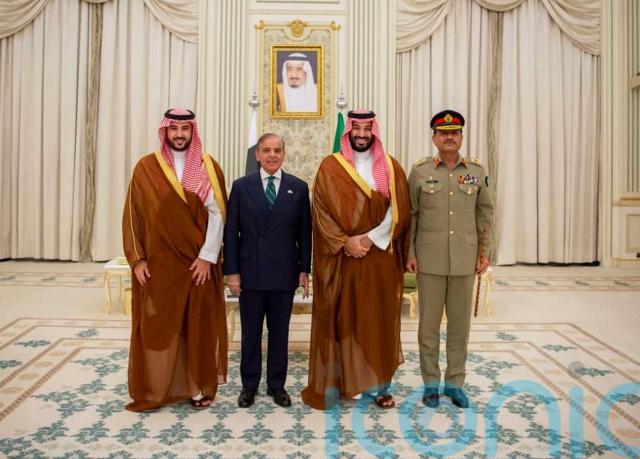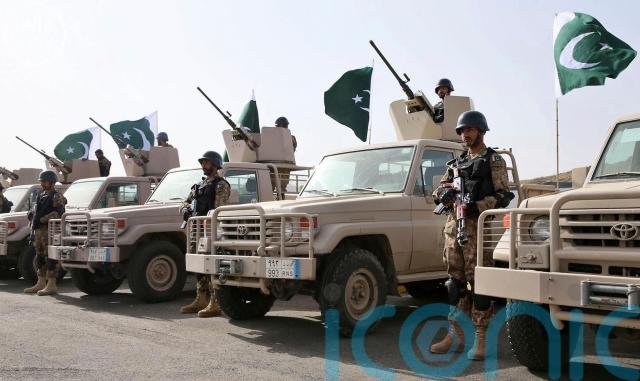
Saudi Arabia and nuclear-armed Pakistan have signed a mutual defense pact that regards any attack on either nation as an attack on both in the wake of Israel’s strike on Qatar earlier this month.
The kingdom has long had close economic, religious and security ties to Pakistan, including reportedly providing funding for Islamabad’s nuclear weapons programme as it developed.
Analysts — and Pakistani diplomats in at least one case — have suggested over the years that Saudi Arabia could be included under Islamabad’s nuclear umbrella, particularly as tensions have risen over Iran’s atomic programme.
But the timing of the pact appeared to be a signal to Israel, long suspected to be the Middle East’s only nuclear-armed state, which has conducted a sprawling military offensive since Hamas’s October 7 2023 attack on Israel, stretching across Iran, Lebanon, the Palestinian territories, Qatar, Syria and Yemen.
Israel did not immediately acknowledge the pact, which was the first firm defence decision made by a Gulf Arab country since the Qatar attack last week.
The US, long the security guarantor for the Gulf states, also did not immediately acknowledge the agreement.
Saudi Arabia’s Crown Prince Mohammed bin Salman signed the pact on Wednesday with Pakistan’s prime minister Shehbaz Sharif.
While not specifically discussing the bomb, the agreement states “any aggression against either country shall be considered an aggression against both”, according to statements issued by both Pakistan’s foreign affairs ministry and the state-run Saudi Press Agency.
“This agreement… aims to develop aspects of defence co-operation between the two countries and strengthen joint deterrence against any aggression,” the statement said.
Pakistan and Saudi Arabia have a defence relationship stretching back decades, in part due to Islamabad’s willingness to defend the Islamic holy sites of Mecca and Medina in the kingdom.

Pakistani troops first travelled to Saudi Arabia in the late 1960s over concerns about Egypt’s war in Yemen at the time.
These ties increased after Iran’s 1979 Islamic Revolution and the kingdom’s fears of a confrontation with Tehran.
Pakistan developed its nuclear weapons programme to counter India’s atomic bombs.
The two neighbours have fought multiple wars against each other and again came close to open warfare after an attack on tourists in April in Indian-controlled Kashmir.
India is believed to have an estimated 172 nuclear warheads, while Pakistan has 170, according to the Bulletin of Atomic Scientists.
India’s foreign ministry acknowledged the Saudi-Pakistan pact on Thursday and said it “will study the implications of this development for our national security as well as for regional and global stability”.

Saudi Arabia also maintains close ties with India.
Retired Pakistani Brigadier General Feroz Hassan Khan, in his book on his country’s nuclear weapons programme, said Saudi Arabia provided “generous financial support” for the scheme’s effort.
In a 2007 US diplomatic cable published by WikiLeaks, American diplomats in Saudi Arabia noted that their Pakistani counterparts had brought up the idea of the kingdom pursuing a weapons programme alongside Islamabad.
Saudi Arabia has also sought US assistance to advance a civilian nuclear power programme, in part with what had been a proposed diplomatic recognition deal with Israel prior to the 2023 Hamas attack.
This could allow Saudi Arabia to enrich uranium in the kingdom — something that worries non-proliferation experts as spinning centrifuges opens the door to a possible weapons programme.
Subscribe or register today to discover more from DonegalLive.ie
Buy the e-paper of the Donegal Democrat, Donegal People's Press, Donegal Post and Inish Times here for instant access to Donegal's premier news titles.
Keep up with the latest news from Donegal with our daily newsletter featuring the most important stories of the day delivered to your inbox every evening at 5pm.